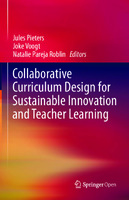Collaborative Curriculum Design for Sustainable Innovation and Teacher Learning
Contributor(s)
Pieters, Jules (editor)
Voogt, Joke (editor)
Pareja Roblin, Natalie (editor)
Language
EnglishAbstract
This open access book provides insight into what it takes to actively involve teachers in the curriculum design process. It examines different aspects of teacher involvement in collaborative curriculum design, with specific attention to its implications for sustainable curriculum innovation and teacher learning. Divided into six sections, the book starts out by introducing the notion of collaborative curriculum design and discusses its historical and theoretical foundations. It describes various approaches commonly adopted to actively involve teachers in the (co-)design of curriculum materials. Sections two and three provide examples of what key phases in the curriculum design process - such as needs analysis, design and development, and implementation - look like across various collaborative curriculum design projects. Section four reports on the impact of collaborative curriculum design on student learning, teacher practices, teacher professional growth, and institutional change. Building on the research evidence about the outcomes of collaborative curriculum design, section five focuses on sustainability, scaling-up and curriculum leadership issues, which are key to the continuation and further evolution of curriculum innovations. Future perspectives are addressed in section six with emphasis on the infrastructure of a sustainable curriculum innovation.
Keywords
Education; Curriculums (Courses of study); Education—Curricula; Teaching; Educational technology; International education ; Comparative education; Professional education; Vocational educationDOI
10.1007/978-3-030-20062-6Publisher
Springer NaturePublisher website
https://www.springernature.com/gp/products/booksPublication date and place
Cham, 2019Classification
Education
Curriculum planning and development
Teacher training
Industrial or vocational training
Educational equipment and technology, computer-aided learning (CAL)


 Download
Download Web Shop
Web Shop